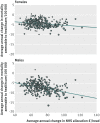The impact of NHS resource allocation policy on health inequalities in England 2001-11: longitudinal ecological study
- PMID: 24865459
- PMCID: PMC4035504
- DOI: 10.1136/bmj.g3231
The impact of NHS resource allocation policy on health inequalities in England 2001-11: longitudinal ecological study
Abstract
Objective: To investigate whether the policy of increasing National Health Service funding to a greater extent in deprived areas in England compared with more affluent areas led to a reduction in geographical inequalities in mortality amenable to healthcare.
Design: Longitudinal ecological study.
Setting: 324 lower tier local authorities in England, classified by their baseline level of deprivation.
Intervention: Differential trends in NHS funds allocated to local areas resulting from the NHS resource allocation policy in England between 2001 and 2011.
Main outcome measure: Trends in mortality from causes considered amenable to healthcare in local authority areas in England. Using multivariate regression, we estimated the reduction in mortality that was associated with the allocation of additional NHS resources in these areas.
Results: Between 2001 and 2011 the increase in NHS resources to deprived areas accounted for a reduction in the gap between deprived and affluent areas in male mortality amenable to healthcare of 35 deaths per 100,000 population (95% confidence interval 27 to 42) and female mortality of 16 deaths per 100,000 (10 to 21). This explained 85% of the total reduction of absolute inequality in mortality amenable to healthcare during this time. Each additional £10 m of resources allocated to deprived areas was associated with a reduction in 4 deaths in males per 100,000 (3.1 to 4.9) and 1.8 deaths in females per 100,000 (1.1 to 2.4). The association between absolute increases in NHS resources and improvements in mortality amenable to healthcare in more affluent areas was not significant.
Conclusion: Between 2001 and 2011, the NHS health inequalities policy of increasing the proportion of resources allocated to deprived areas compared with more affluent areas was associated with a reduction in absolute health inequalities from causes amenable to healthcare. Dropping this policy may widen inequalities.
© Barr et al 2014.
Conflict of interest statement
Competing interests: All authors have completed the ICMJE uniform disclosure form at
Figures



Comment in
-
Can higher NHS spending in deprived areas reduce health inequalities?BMJ. 2014 May 29;348:g3388. doi: 10.1136/bmj.g3388. BMJ. 2014. PMID: 24874273 No abstract available.
References
-
- Thompson G. NHS expenditure in England. Library of the House of Commons, 2009.
-
- Bojke C, Castelli A, Grasic K, Street A. NHS productivity from 2004/5 to 2010/11. Centre for Health Economics, University of York, 2013.
-
- Richardson E, Pearce J, Mitchell R, Shortt N, Tunstall H. Have regional inequalities in life expectancy widened within the European Union between 1991 and 2008? Eur J Public Health 2013, published online 27 Jun. 10.1093/eurpub/ckt084. - DOI - PubMed
-
- Gilson L, Doherty J, Loewenson R, Francis V. Knowledge network on health systems. WHO Commission on the Social Determinants of Health, 2007.
Publication types
MeSH terms
Grants and funding
LinkOut - more resources
Full Text Sources
Other Literature Sources
Medical
Miscellaneous
